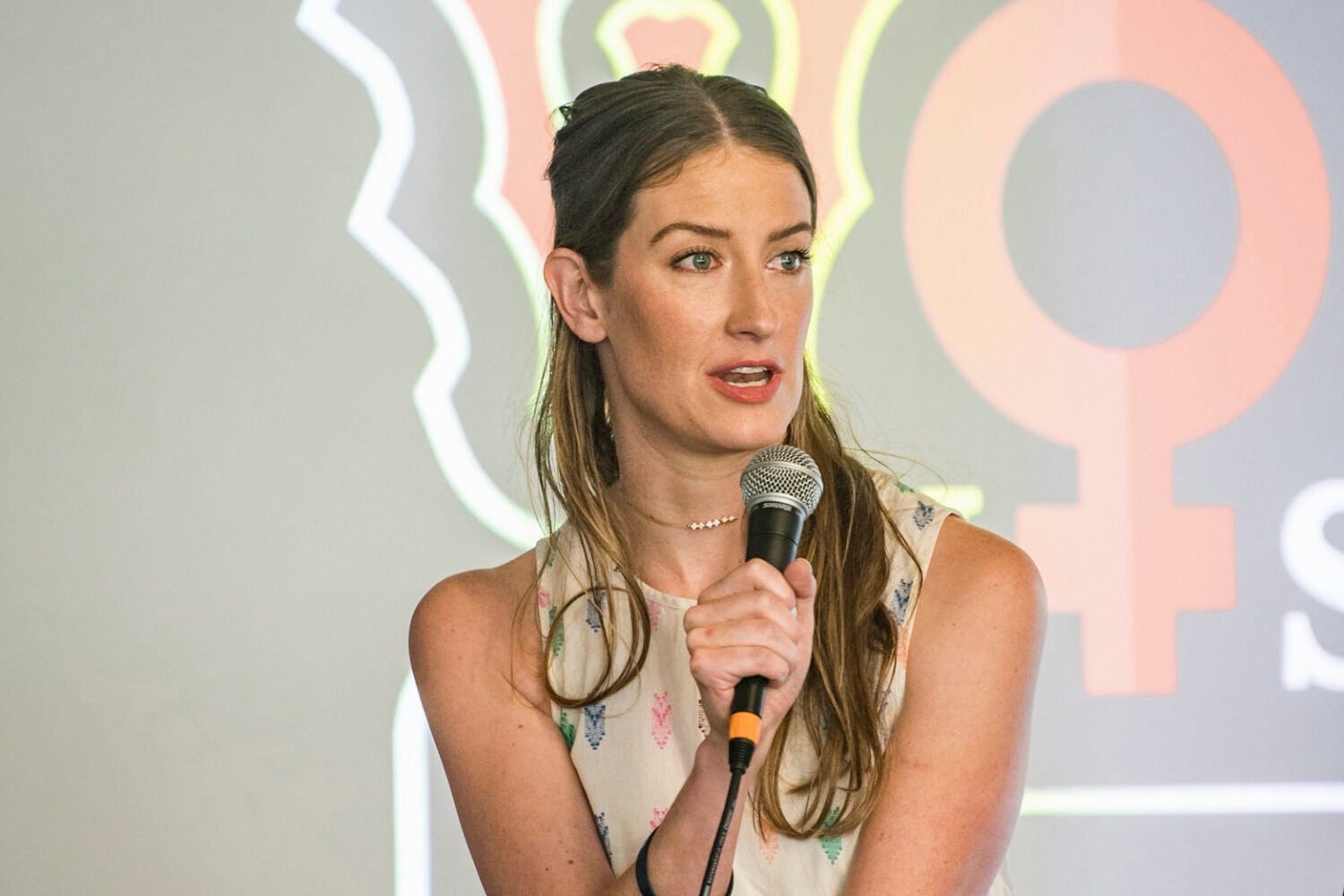Thinking back on the soccer days of her youth, Kim Miner ’15 remembers “mostly ending up on the ground.” So, she switched to softball, she said, where “contact was limited.”
It was a wise choice. Miner excelled at the sport, eventually becoming a varsity pitcher in college, but she never lost her interest in the beautiful game. Her sister played in goal, and Miner supported her from the sidelines. She also supported another group of young soccer players making their mark on and off the field.
“It was the Mia Hamm, Brandi Chastain generation,” said Miner, recalling two standouts on the U.S. women’s national team that won the World Cup in 1999. “I remember watching all of them be so strong and seeing fans of all different backgrounds get behind them and have such tremendous interest and appreciation for what they were doing. As a young person, seeing that and expecting that to be the norm was really impactful.”
Today, Miner is helping new generations, young and old, embrace women’s professional soccer. In November she became chief of staff and chief legal officer of the new Boston team in the National Women’s Soccer League that is set to begin play in 2026. As part of her job, Miner will be responsible for making sure White Stadium in Boston’s Franklin Park — the team’s future home pitch — is ready for kickoff in two years. Fortunately, she knows exactly what it takes to get a professional sports venue up and running.
At Harvard Law, Miner balanced her studies with work for the Red Sox, gradually taking on special projects for its then-President and Chief Executive Officer Larry Lucchino. After graduation she joined WilmerHale’s corporate practice for a year before teaming up again with Lucchino from 2016 to 2023, ultimately becoming executive vice president and general counsel for the Pawtucket Red Sox, the major league team’s Triple-A affiliate based in Rhode Island. With Lucchino, the team’s chairman and co-owner, Miner was instrumental in trying to secure a new ballpark for the club. When a financing deal languished at the Rhode Island Statehouse, the team began talks with other suitors, and chose to relocate to Worcester in 2021. Miner helped solicit feedback from residents and helped negotiate and oversee the development of a new downtown ballpark for the rebranded WooSox.
She admits her time in baseball wasn’t always easy, but it was invaluable.
Being a young female lawyer in a position of great authority had its challenges.
“I had no peers to talk to at other teams at the minor-league level about creating a legal department from scratch, and being a young female lawyer in a position of great authority presented all kinds of challenges,” she said. “It was getting people to understand the value I could add and developing systems and all the things that go into creating an effective legal department. It was difficult, but the experience developed my skills at an accelerated pace.”
Miner also credits Harvard with helping prepare her for a career in professional sports. She studied with sports law expert and Harvard Lecturer on Law Peter Carfagna ’79; cross-registered in Harvard Business School classes; and took part in Harvard Law’s mediation and negotiation programs. She also enrolled in an advanced legal writing class her 3L year whose lessons still resonate. “Being a general counsel, you’re constantly creating different agreements, and you might be starting with a blank sheet of paper,” said Miner. “I felt like that class prepared me really well for much of what I do now.”
Miner used law school parlance to describe a typical day helping lead the new soccer franchise while wearing two different hats: “I’m issue spotting all over the place,” she said, whether it’s in a contract negotiation, a development deal, a permitting process, or a hiring decision. “There are opportunities throughout the day where I can call on my legal experience,” she said, “but I’m also very much focused on the overall strategy and building out of the club.”
For Miner, a key to the Boston team’s success will involve developing strong connections with fans, and with the wider community. She considers the league’s four-year media deal with CBS Sports, ESPN, Prime Video, and Scripps a major plus that will help solidify the team’s fan base.
Equally important will be the transformation of White Stadium (built in 1945), with input from the community, into a state-of-the-art facility for professional women’s soccer and local high school teams. While the plan to rehabilitate the venue has encountered opposition from some members of the public, Miner believes the restoration of the historic stadium will ultimately enhance the fan experience and benefit the local community by supporting Boston Public Schools’ student-athletes, teams, and coaches, who rely on it for their sporting events.
“Developing natural connections in the community and making sure that you are reflecting their priorities is so critical,” said Miner. “I am always keeping an eye on that, and it’s present in everything we do.”
